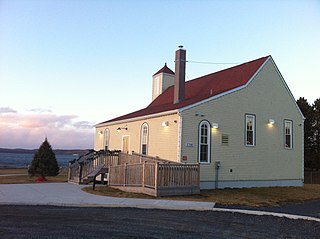 W
WAfricville was a small community of predominantly Black Canadians located in Halifax, Nova Scotia, Canada. It developed on the southern shore of Bedford Basin and existed from the early 1800s to the 1960s. From 1970 to the present, a protest has occupied space on the grounds. The government has recognized it as a commemorative site and established a museum here. The community has become an important symbol of Black Canadian identity, as an example of the "urban renewal" trend of the 1960s that razed similarly racialized neighbourhoods across Canada, and the struggle against racism.
 W
WCabbagetown is a neighbourhood in central Toronto, Ontario, Canada. Administratively, it is defined as part of the Cabbagetown-South St. Jamestown neighbourhood. It largely features semi-detached Victorian houses and is recognized as "the largest continuous area of preserved Victorian housing in all of North America", according to the Cabbagetown Preservation Association.
 W
WThe Chinatown in Victoria, British Columbia is the oldest Chinatown in Canada and the second oldest in North America after San Francisco's. Victoria's Chinatown had its beginnings in the mid-nineteenth century in the mass influx of miners from California to what is now British Columbia in 1858. It remains an actively inhabited place and continues to be popular with residents and visitors, many of whom are Chinese-Canadians. Victoria's Chinatown is now surrounded by cultural, entertainment venues as well as being a venue itself. Chinatown is now conveniently just minutes away from other sites of interests such as the Save-On-Foods Memorial Centre, Bay Centre, Empress Hotel, Market Square, and others.
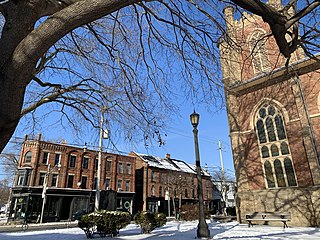 W
WCorktown is an older residential neighbourhood in downtown Toronto, Ontario, Canada. The neighbourhood is south of Regent Park, north of the Gardiner Expressway, east of Parliament Street, and west of Don River to the east. Corktown contains many vacated industrial buildings, some now used for movie production, and others repurposed for studios and shops. The West Don Lands development is in the south-east corner of this area.
 W
WThe Distillery District is a commercial and residential district in Toronto, Ontario, Canada. Located east of downtown, it contains numerous cafés, restaurants, and shops housed within heritage buildings of the former Gooderham and Worts Distillery. The 13 acres (5.3 ha) district comprises more than forty heritage buildings and ten streets, and is the largest collection of Victorian-era industrial architecture in North America.
 W
WDowntown Moncton is a central neighbourhood in the city of Moncton, New Brunswick.
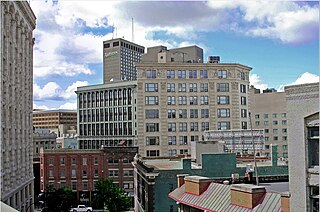 W
WThe Exchange District is a National Historic Site of Canada in the downtown area of Winnipeg, Manitoba, Canada. Just one block north of Portage and Main, the Exchange District comprises twenty city blocks and approximately 150 heritage buildings, and it is known for its intact early 20th century collection of warehouses, financial institutions, and early terra cotta clad skyscrapers.
 W
WThe Forks is a historic site, meeting place and green space in Downtown Winnipeg located at the confluence of the Red River and the Assiniboine River.
 W
WGastown is the original settlement that became the core of the creation of Vancouver, British Columbia, Canada. Currently, it is a national historic site and a neighbourhood in the northwest end of Downtown Eastside, adjacent to Downtown Vancouver.
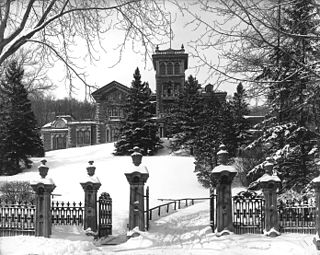 W
WThe Square Mile and also known as the Golden Square Mile is the nostalgic name given to an urban neighbourhood developed principally between 1850 and 1930 at the foot of Mount Royal, in the west-central section of downtown Montreal, Quebec, Canada. The name "Square Mile" has been used to refer to the area since the 1930s; prior to that, the neighborhood was known as 'New Town' or 'Uptown'. The addition of 'Golden' was coined by Montreal journalist Charlie Lazarus, and the name has connections to contemporary real-estate developments, as the historical delimitations of the Golden Square Mile overlap with Montreal's contemporary central business district.
 W
WGoose Village was a neighbourhood in Montreal, Quebec, Canada. Its official but less commonly used name was Victoriatown, after the adjacent Victoria Bridge. The neighbourhood was built on an area formerly known as Windmill Point, where thousands of Irish immigrants died from disease in 1847 and 1848.
 W
WSaint Laurent Boulevard also known as Saint Lawrence Boulevard is a major street in Montreal, Quebec, Canada. A commercial artery and cultural heritage site, the street runs north-south through the near-centre of city and is nicknamed The Main which is the abbreviation for "Main Street".
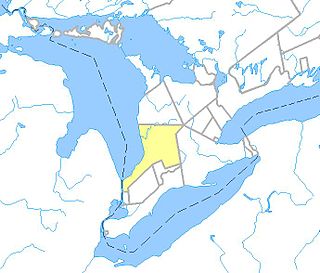 W
WThe Huron Tract Purchase also known as the Huron Block, registered as Crown Treaty Number 29, is a large area of land in southwestern Ontario bordering on Lake Huron to the west and Lake Erie to the east. The area spans the counties of Huron, Perth, Middlesex and present day Lambton County, Ontario in the province of Ontario.
 W
WThe Hydrostone is a neighbourhood in the North End of the Halifax Peninsula in the Halifax Regional Municipality, Nova Scotia, Canada. It consists of ten short parallel streets and is bordered by Duffus Street to the north, Young Street to the south, Isleville Street to the west and Novalea Drive to the east.
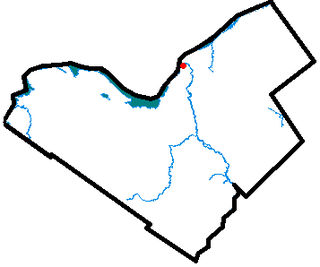 W
WLower Town (also spelled "Lowertown" is a neighbourhood in Rideau-Vanier Ward in central Ottawa, Ontario, Canada, to the east of downtown. It is the oldest part of the city. It is bounded by Rideau Street to the south, the Ottawa River to the west and north and the Rideau River to the east. It includes the commercial Byward Market area in the south-western part, and is predominantly residential in the north and east.
 W
WOld Montreal is a historic neighbourhood within the municipality of Montreal in the province of Quebec, Canada. Founded by French settlers in 1642 as Fort Ville-Marie, Old Montreal is home to many structures dating back to the era of New France. The 17th century settlement lends its name to the borough in which the neighbourhood lies, Ville-Marie. Home to the Old Port of Montreal, the neighbourhood is bordered on the west by McGill Street, on the north by Ruelle des Fortifications, on the east by rue Saint-André, and on the south by the Saint Lawrence River. Following recent amendments, the neighbourhood has expanded to include the Rue des Soeurs Grises in the west, Saint Antoine Street in the north, and Saint Hubert Street in the east. In 1964, much of Old Montreal was declared a historic district by the Ministère des Affaires culturelles du Québec.
 W
WOld Quebec is a historic neighbourhood of Quebec City, Quebec, Canada. Comprising the Upper Town and Lower Town, the area is a UNESCO World Heritage Site. Administratively, Old Quebec is part of the Vieux-Québec–Cap-Blanc–colline Parlementaire district in the borough of La Cité-Limoilou.
 W
WOld Town is a neighbourhood and retail district in downtown Toronto, Ontario, Canada. It was the first of Toronto's named neighbourhoods, having acquired the moniker no later than 1815, at which time the original town of York was expanding. The old neighbourhood was referred to as "Old Town" by residents, and the new neighbourhood as "New Town". The site still has many buildings dating back to the nineteenth century.
 W
WSaint Laurent Boulevard also known as Saint Lawrence Boulevard is a major street in Montreal, Quebec, Canada. A commercial artery and cultural heritage site, the street runs north-south through the near-centre of city and is nicknamed The Main which is the abbreviation for "Main Street".
 W
WSt. Lawrence is a neighbourhood located in downtown Toronto, Ontario, Canada. The area, a former industrial area, is bounded by Yonge, Front, and Parliament Streets, and the Canadian National railway embankment. The Esplanade off Yonge St., lined with restaurants, cafés and hotels runs through the middle of the area. In previous times, the area was sometimes referred to as 'St. Lawrence Ward' or more often today as 'St. Lawrence Market', synonymous with the large retail vendor market which is the neighbourhood's focal point. The area is the site of a large city-sponsored housing project of the 1970s, which revitalized an old 'brownfields' area. The boundaries of the St Lawrence Neighbourhood Association and the St Lawrence Market BIA are somewhat larger than those noted above. Both groups have boundaries that extend from Yonge to Parliament Streets and Queen Street East to the rail corridor.
 W
WStephen Avenue is a major pedestrian mall in downtown Calgary, Alberta, Canada. The mall is the portion of 8 Avenue SW between 4 Street SW and 1 Street SE. It is open to vehicles only from 6:00 p.m. to 6:00 a.m.
 W
WThe Trinity Royal Heritage Conservation Area is a historic district in Saint John, New Brunswick's uptown. The City of Saint John designated the area as the city's first heritage conservation area in 1982; it has since expanded in area. Surrounding the Trinity Anglican Church, the area includes several National Historic Sites of Canada within its boundaries. Much of the area consists of Victorian brick buildings raised after The Great Fire of Saint John, New Brunswick that destroyed much of the city's central peninsula in 1877.
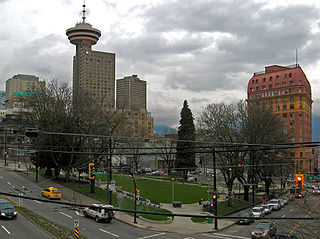 W
WVictory Square is a park in Vancouver, British Columbia, Canada. The square is bordered by West Hastings Street to the northeast, West Pender Street to the southwest, Cambie Street to the southeast, and Hamilton Street to the northwest. The term is also used to refer to the neighbourhood immediately surrounding the square.